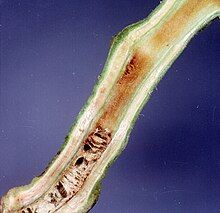Ralstonia
| Ralstonia | |
|---|---|
| Scientific classification | |
| Domain: | Bacteria |
| Phylum: | Pseudomonadota |
| Class: | Betaproteobacteria |
| Order: | Burkholderiales |
| Family: | Burkholderiaceae |
| Genus: | Ralstonia Yabuuchi et al. 1996 |
| Species | |
|
Ralstonia insidiosa | |

Ralstonia is a genus of bacteria, previously included in the genus Pseudomonas. It is named after the American bacteriologist Ericka Ralston.[2] Ericka Ralston was born in 1944 in Saratoga, California, and died in 2015 in Sebastopol, California. While in graduate school at the University of California at Berkeley, she identified 20 strains of Pseudomonas which formed a phenotypical homologous group,[3] and named them Pseudomonas pickettii, after M.J. Pickett in the Department of Bacteriology at the University of California at Los Angeles, from whom she had received the strains. Later, P. pickettii was transferred to the new genus Ralstonia, along with several other species.[4] She continued her research into bacterial pathogenesis under the name of Ericka Barrett while a professor of microbiology at the University of California at Davis from 1977 until her retirement in 1996.
Genomics
[edit]- Ralstonia Genome Projects (from Genomes OnLine Database)
- Comparative Analysis of Ralstonia Genomes (at DOE's IMG system)
Ralstonia has also been identified as a common contaminant of DNA extraction kit or PCR reagents, which may lead to its erroneous appearance in microbiota or metagenomic datasets.[5] Ralstonia is one of the most common pathogens for causing nosocomial infections in immunocompromised patients.[6][7] Those receiving mechanical ventilation are twelve times more likely of developing the infection than those not on a mechanical ventilator.[8]
Ecology
[edit]Ralstonia has been identified in the milk of water deer, reindeer and goats.[citation needed] Ralstonia pickettii, Ralstonia insidiosa and Ralstonia mannitolilytica have been found in many different environments including in clinical situations where they can act as pathogens.[9] Ralstonia has been also reported as responsible for nosocomial outbreaks of bloodstream infections, linked to the contamination of medication vials.[10]
Outbreaks
[edit]On 28 November 2023 an outbreak of Ralstonia was reported in hospitals across Australia from an apparent contamination of Saline products imported from overseas. There are 43 suspected cases of infection, and one death of an elderly patient in the state of Queensland. The outbreak led the Therapeutic Goods Administration to issue an alert, and remove two saline products from Australian private and public hospitals.[11][12]
References
[edit]- ^ LPSN lpsn.dsmz.de
- ^ Garrity, George (2001). Bergey's Manual of Systematic Bacteriology. Springer Science & Business Media. p. 612. ISBN 9780387241456.
- ^ RALSTON, ERICKA; PALLERONI, N. J.; DOUDOROFF, M. (1973-01-01). "Pseudomonas pickettii, a New Species of Clinical Origin Related to Pseudomonas solanacearum". International Journal of Systematic and Evolutionary Microbiology. 23 (1): 15–19. doi:10.1099/00207713-23-1-15.
- ^ Yabuuchi, Eiko; Kosako, Yoshimasa; Yano, Ikuya; Hotta, Hisako; Nishiuchi, Yukiko (1995-11-01). "Transfer of Two Burkholderia and An Alcaligenes Species to Ralstonia Gen. Nov". Microbiology and Immunology. 39 (11): 897–904. doi:10.1111/j.1348-0421.1995.tb03275.x. ISSN 1348-0421. PMID 8657018.
- ^ Salter, S; Cox, M; Turek, E; Calus, S; Cookson, W; Moffatt, M; Turner, P; Parkhill, J; Loman, N; Walker, A (2014). "Reagent contamination can critically impact sequence-based microbiome analyses". bioRxiv 10.1101/007187.
- ^ Fang, Qingqing; Feng, Yu; Feng, Ping; Wang, Xiaohui; Zong, Zhiyong (2019-04-23). "Nosocomial bloodstream infection and the emerging carbapenem-resistant pathogen Ralstonia insidiosa". BMC Infectious Diseases. 19 (1): 334. doi:10.1186/s12879-019-3985-4. ISSN 1471-2334. PMC 6480722. PMID 31014269.
- ^ Ryan, M; Pembroke, J; Adley, C (March 2006). "Ralstonia pickettii: a persistent Gram-negative nosocomial infectious organism". Journal of Hospital Infection. 62 (3): 278–284. doi:10.1016/j.jhin.2005.08.015. PMID 16337309.
- ^ Waugh, Jonathan B.; Granger, Wesley M.; Gaggar, Amit (2010). "Incidence, Relevance and Response for Ralstonia Respiratory Infections". Clinical Laboratory Science. 23 (2): 99–106. doi:10.29074/ascls.23.2.99. ISSN 0894-959X. PMC 4086841. PMID 20499534.
- ^ Ryan, M. P.; Adley, C. C. (2014-03-01). "Ralstonia spp.: emerging global opportunistic pathogens". European Journal of Clinical Microbiology & Infectious Diseases. 33 (3): 291–304. doi:10.1007/s10096-013-1975-9. ISSN 1435-4373. PMID 24057141. S2CID 8228942.
- ^ Fabricci, Massimiliano; Trinca, Anaïs; Talotti, Luca; Busetti, Marina; Fotakis, Emmanouil Alexandros; Merakou, Christina; Koncan, Raffaella; Ghiotti, Annachiara; Negri, Camilla; Di Maso, Vittorio; Bosco, Manuela; Antonelli, Alberto; Coppi, Marco; Rossolini, Gian Maria; Giuliani, Claudia (July 2023). "A urokinase-associated outbreak of Ralstonia mannitolilytica bloodstream infections in haemodialysis patients in north-eastern Italy, January to April 2023". Euro Surveillance. 28 (28): 2300328. doi:10.2807/1560-7917.ES.2023.28.28.2300328. ISSN 1560-7917. PMC 10347894. PMID 37440346.
- ^ "Contaminated saline products recalled over hospital bacterial outbreak linked to Queensland death". The Guardian. Australian Associated Press. 2023-11-28. ISSN 0261-3077. Retrieved 2023-11-28.
- ^ "Death at Queensland hospital suspected to be linked to contaminated saline". ABC News. 2023-11-27. Retrieved 2023-11-28.
